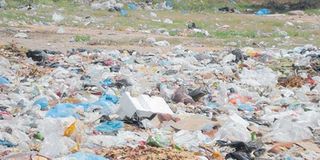This is what Tanzania is doing about plastic bags

When livestock come across plastic bags which have been turned into waste and thrown in the environment they eat them and get choked. PHOTO | FILE
What you need to know:
- With six tonnes of plastic bags produced locally and 170 other tonnes imported, the environmental disaster is indeed huge.
Dar es Salaam. One of the biggest challenges facing Tanzania is the use of plastic bags.
With six tonnes of plastic bags produced locally and 170 other tonnes imported, the environmental disaster is indeed huge.
The government is still in the process of coming up with a decision to ban the products as it dialogues with stakeholders are going to find a solution.
The government has so far not put a total ban on the manufacture, supply and importation of the products as it analyses the magnitude of the action in terms of jobs and economic benefits to the country.
This is despite the government having announced in 2015 that itplanned to ban the use of plastic bags as it adopts new environmentalregulations that aimed at combatting pollution and environmentaldegradation.
Rwanda and Kenya have eliminated the use of plastic bags.
An assistant director in the Environment Pollution Control Unit in the Vice President’s Office (Union Affairs and Environment), Ms Magdalena Mtenga, told The Citizen that they were still discussing with other ministries to find the solution on how to implement the ban without affecting adversely any party.
“The government has not put a total ban on the plastic bags even as itintroduces woven material bags into the market as a strategy to enduse of the latter in the country,” she said.
She said they were surveying mining sites, water resources, the ocean, lakes and other areas to see how best the situation could be implemented.
“To safeguard the environment, people need to be well educated and given appropriate information in the process.”
She stressed that since the government introduced to the market new woven material bags it was imperative that the public avoided use of banned plastic bags.
According to her, plastic bags are among the causes of environmental toxic waste.
She urged people to stop using plastic bags and find alternativepaper bags as part of protecting the environment against unwarranted pollution.
She stressed that the government was encouraging alternative materials for bags and in view of the same had stopped issuing licences to new industries as it sought solutions and only the existing ones continued to produce the same.
According to her, neighbouring countries like Kenya and Uganda had succeeded in banning plastic bags and made sure the public was aware of the dangers of such product whichmade the introduction of woven material bags into the market easier.
“The public needs to be aware of the hazards of plastic bags to the environment and most especially to domestic animals as well as fish in the sea.”
The deputy minister in the Vice President’s Office (Union and Environment), Mr Kangi Lugola, told The Citizen that the government had put in place a policy aimed at protecting the environment.
He said the major factor that was contributing to the destruction of the environment was solid waste which also included plastic bags.
He said that when livestock come across plastic bags which have been turned into waste and thrown in the environment they eat them as part of the grass while in the seas fish also consume them, choking them.
He noted that in view of such challenges, the government was nowlooking at having manufacturers produce bags with at least 50 macrons and above. Adding that, they were still in dialogue with the Ministry of Industry, Trade and investment as well as the Prime Minister’s Office to take note of the level of the problem.




